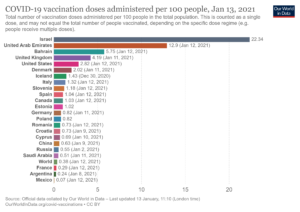Israel’s vaccination victory:Running ahead or running over?

Within three weeks of vaccinating its first citizen, Israel has dominated the global vaccination initiative, successfully vaccinating over 20 percent of its population.
The country’s political science has also supported to get people inoculated, with Prime Minister Netanyahu himself taking charge of the entire process, it seems that the soon approaching general election might have had a role to play in the PM’s determination towards the project.
Netanyahu has moved quickly to guarantee supplies of the vaccine, interacting directly with Pfizer’s Greek-born chief executive, Albert Bourla, whose parents were among the few Jews in Thessalonika to escape the Holocaust.
Netanyahu revealed on January 7th that Israel struck an agreement with Pfizer to exchange citizens’ data for 10 million doses of the coronavirus vaccine, including a promise of shipments of 400,000-700,000 doses every week.
The secret to Israel’s vaccine success
Equally, Israel was prepared to pay a very high price for early delivery, according to reports in the Israeli media, with the Minister for Finance Yisrael Katz refusing to say exactly how much despite repeated questioning.
But one anonymous official said that Prime Minister Benjamin Netanyahu’s government was “paying around $30 per vaccine dose, or around twice the price abroad”.

Israel has a mandatory public health system connected to a nationwide digital network. Health maintenance organizations keep digital records of all patients, allowing any authorized computer to extract people’s medical data since birth — including past hospitalizations, prescribed medications and vaccinations.
“An operation at such scale could not have happened in a private health care system,” said a senior nurse at Israel’s renowned Ichilov hospital in Tel Aviv, who preferred to remain anonymous. She has vaccinated hundreds of people against the coronavirus so far.
“I have never seen so many health care workers volunteering their free time for the greater cause like this,” she explained. The sense of social solidarity and the feeling of being in this together has contributed massively to the speed of Israel’s vaccination campaign — “perhaps more so than in other countries,” she said.
Distribution techniques
Israel, which has reported more than 450,000 Covid-19 cases and 3,445 deaths, cast a wide net for securing vaccines early on, and last June became one of the first countries to reach a purchase agreement with Moderna.
Moderna has said it will begin delivery of 6 million doses this month, though Mr Edelstein said the shipment was probably two months away. In November, Israel announced similar deals with AstraZeneca and Pfizer, and the first Pfizer shipment arrived on 9 December.
A deeper divide
Despite leading vaccination campaigns worldwide, Israel has come under fire from human rights groups and news organizations for completely ignoring their Palestinian counterparts, around a third of the 14 million people living between the Jordan River and the Mediterranean Sea are not included in this vaccination campaign.
Isreal has successfully vaccinated its Jewish population in the West bank but not the Palestinian population there or the hundreds living in an impoverished and cramped situation in Gaza. The Palestinian confirmed over 100,000 cases in the area with over a 1,000 dead.
Meanwhile, various communities like the Arab minority in Israel, roughly 21 percent of the total population have shown a reluctance towards vaccination. Also included in this list are the ultra-orthodox Jewish communities that are actively violating the coronavirus control measures, resulting in infection rates that are around five times higher in comparison to secular cities. On the other hand, Netanyahu has vowed to increase Israel’s vaccination pace to at least 170,000 people per day.
Whatever the political arrangement between the Israeli government and the Palestinian Authority, Israel as an occupying power has a responsibility for those living under its occupation.
Last Tuesday B’Tselem, a non-profit organisation based in Jerusalem, published a paper advocating to declare the present status quo of Israel ought to be considered as an “äparthite regime”
Why is the EU lagging behind?
The EU governments are facing growing pressure to speed up Covid-19 vaccination rates as sluggish progress triggers a new political blame game. The inoculation rate in the EU is lagging far behind its fellow counterparts. While UK has now vaccinated more than 1 million people, EU giant Germany has administered only about 265,000 shots of the 1.3m it has received so far.
Madrid, for example, last week used only about 6 percent of the first 49,000 doses of the BioNTech/Pfizer vaccine it received. Antonio Zapatero, regional leader of the Covid-19 response, blamed the sluggish start on a day-long delay in the first delivery of vaccines, as well as requests from nursing homes to wait until after the new year’s holiday.
One reason for the low rates is that the EU’s medical regulator gave its approval to the BioNTech/Pfizer vaccine later than authorities in the UK, Israel and the US — though the EU body is set to give the green light to a second, made by Moderna of the US, in the next few days.
Another issue that has emerged is the apparent inability of some EU member states to distribute the vaccine doses they already have, with sharp regional variations in inoculation rates, EU’s capacity to administer and deliver the vaccine is not quite in place yet across Europe.
Ireland’s own battle against the disease seems arduous one; with the highest number of daily confirmed Covid-19 cases in the world for every million people, maybe it is time to re-evaluate our strategy.
However, not all is lost as the first delivery of the Moderna Covid-19 vaccine arrived in Ireland yesterday. Ireland’s Minister for Health said yesterday that it is hoped that 700,000 people will be vaccinated here by the end of March.
While it seems that we are slowly yet steadily arriving at the beginning of the end, the year-long global catastrophe has left us with much to reflect upon.